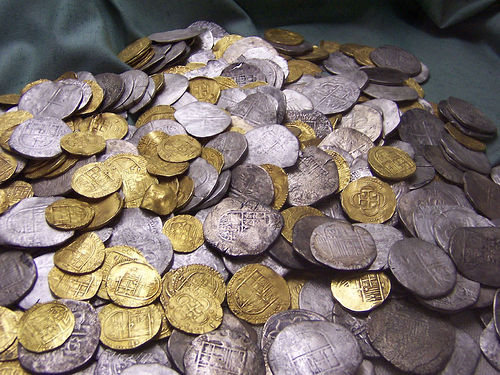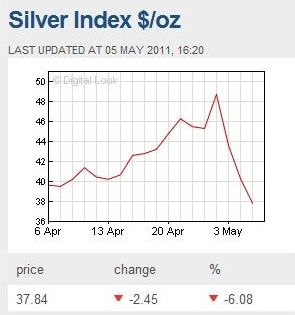The Value of Commodities Can Go Down As Well As Up…

Please note that we are not authorised to provide any investment advice. The content on this page is for information purposes only.
11 May 2011.
No sooner had we breathlessly reported April’s record highs for gold and silver, at over $1,500 

and close to $50 per troy ounce respectively, than commodities stage a ‘flash crash’, startling 

investors and traders alike. Last week silver slumped to below $35 and even gold lost 3.6%.


11 May 2011.
No sooner had we breathlessly reported April’s record highs for gold and silver, at over $1,500 

and close to $50 per troy ounce respectively, than commodities stage a ‘flash crash’, startling 

investors and traders alike. Last week silver slumped to below $35 and even gold lost 3.6%.


The oil benchmark, Brent Crude, recorded its biggest ever one-day fall, dropping further to

 $105.15 a barrel and other commodities including copper, sugar, cotton and cocoa were

 dragged down in their wake.

 Oil’s sell-off may have been prompted by Thursday’s poor economic data from Europe and the 

US, together with evidence of monetary tightening in emerging economies, hurting speculators 

who had hoped to benefit from rising inflation and a weaker dollar.
Perhaps the economics

 of Osama Bin Laden’s death had also brought with it improved prospects for calm in the Middle East. 

Whatever the reasons, ‘bull’ investors recorded big losses in an unseemly scramble for the exit,

 only for Brent Crude Oil prices to later stage a recovery to over $110 by mid-afternoon on Friday

– credited to ‘bargain hunters’ and the more positive jobs picture emerging from the US.
Some 

commentators view this merely as a ‘correction’ but others are less certain, such as Emma

 Pinnock, energy analyst at Inenco, who expects oil prices to drop back below $100 a barrel:
[quote]

“Ultimately the price increases that we saw of almost 12% since the beginning of 2011,

 due to instability in the Middle East, the Japanese earthquake and the nuclear crisis, were 

not sustainable.[/quote]“

Does this indicate the end of a bull run which has driven the prices of many commodities

to record highs? This volatility matters to all of us, as the momentum created by upward or

downward swings in prices of commodities such as oil or gas, affects others included in index 

funds – including food.
And for the world’s poorest, the price of food represents the difference 

between health and starvation.

 Various reasons are cited for these falls, described by one shattered analyst as “horrendous”.

 Silver was the first commodity to collapse earlier in the week and some blame a steep

 appreciation in silver trading costs, prompting a speculative – and contagious – sell-off among 

other commodities.


However, according to Edward Meir, commodities analyst at broker MF Global in New

York:
[quote]“This is one for the books: across the board you’re seeing a general unwinding of the 

commodity trade.” [/quote]Indeed many point to the announcement made the day before by Glencore, 

the world’s biggest commodities trader, of a multibillion-dollar flotation.
For some this marks the 

peak for commodities, in much the same way as the initial public offerings of Goldman Sachs 

and private equity group Blackstone indicated the top of their respective markets.

 Markets could recover rapidly: Although high prices may be denting commodities, farmers,

 miners and oil companies alike still struggle to meet demand.
On the other hand, yet more 

negative economic news, such as lower-than-expected US growth figures for the first quarter,

 could continue to subdue prices. Besides which QE2 is ending soon in the US – with no 

sign [yet] of QE3 – so that less liquidity in the markets may check demand for risky assets such

as commodities. This nervousness is also indicated by bond markets, with the 30-year US

 Treasury yield at its lowest since early December and also explains a flight to the relative safety

 of the dollar and the yen.


However not all commodities are the same. Many traders offer different prospects for different 

commodities, pointing at the unrest in Libya which may continue to impact on oil, while gold

 and silver remain supported by investors willing to buy during the dips.
Ultimately, rampant 

demand from the newly aspirant populations of India, China et al for everything from oil and 

wheat to pork bellies and gold, may support the demand for this planet’s finite resources.
The 

rare earth metals so in demand by the high tech industry were largely unaffected by last week’s

 drama.
‘Rare’ of course indicates the limited nature of supply – perhaps the same term will

 become true of other commodities we currently take for granted. 

If so, speculators will be happy and profit-takers may continue to dictate future ‘corrections’ – if

that is all that is indicated by last week’s dramatics.
However, it offers scant relief for those hard-

pressed families struggling to cope with mounting prices at the petrol pumps and supermarket 

tills.
Alice Briggs
EconomyWatch.com





